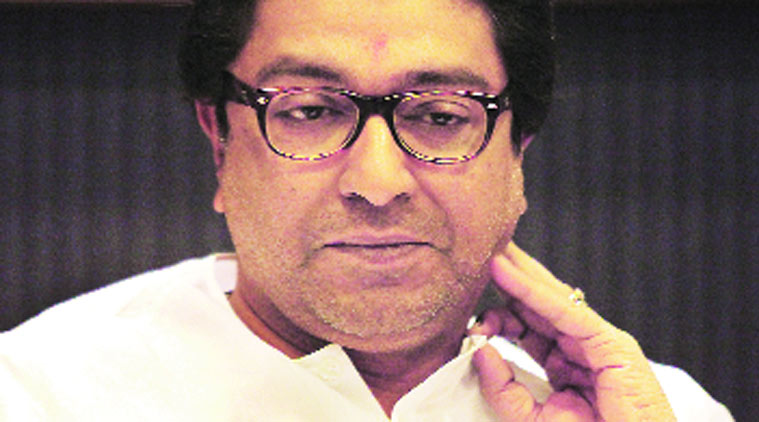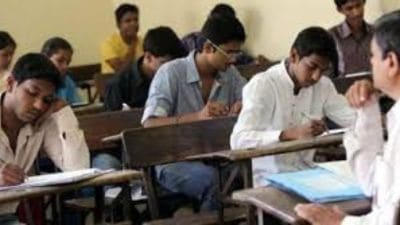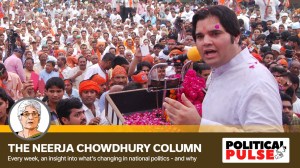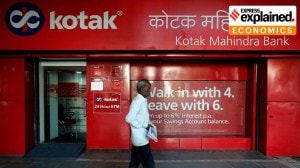- India
- International
The loneliness of Raj Thackeray
Within a decade of being born, MNS stares at uncertain fate after abject defeats in 2014 state and LS polls and desertions.
 Within a decade of being born, MNS stares at uncertain fate after abject defeats in 2014 state and LS polls and desertions.
Within a decade of being born, MNS stares at uncertain fate after abject defeats in 2014 state and LS polls and desertions.
I t is now nearly a decade since Raj Thackeray, standing on the porch of his central Mumbai house, announced his separation from the Shiv Sena while blaming the lack of democracy in the party.
He had then publicly castigated the coterie around the senior Thackeray for sidelining him. “My fight is not with my Vithal (a diety) but with the badwes (priests) surrounding him,” Raj had declared memorably in November 2005. In the background, a group of young leaders cheered lustily, the core team that would sever ties with the Sena alongside the fiery Raj.
In less than a decade later, a majority of this cheering squad voices an almost similar angst as they either announce or contemplate decisions to break away from Raj Thackeray.
The 46-year-old Thackeray, founder of the Maharashtra Navnirman Sena, the newest political entity in the state, was hailed as a game changer in Maharashtra politics. Today, he is on the verge of being called a political non-entity even as the rank and file of his party desert him.
His political downfall is reflected in the party’s electoral performance. From the heady days of 2009 when the then three-year-old party party won 13 seats in the 288-member state’s Legislative Assembly, the party won only one seat in 2014. All its sitting MLAs lost their seats and the party lost its status as a recognised state party, managing just 3.1 per cent of the total votes polled.

While fluctuation in votes may be a reality in the organic growth of all political entities, what has exacerbated Thackeray’s problems is the large-scale desertion by his one-time associates, many of whom were instrumental in helping the party grow. Of the 13 MNS MLAs elected in 2009, five have switched over to the BJP while the majority of the rest are in political hibernation.
“Rajsaheb became a victim of the larger-than-life image that the media created of him. A fledgling party needs a strong and dedicated second rung of leaders who have ears to the ground to ensure its growth. That never happened. The success of 2009 insulated him further and he only relied on the advice of an inner coterie and a few journalists whom he is close to,” a former MNS leader who recently quit the party says.
There have also been complaints that for a fledgling party that was looking to expand, it was odd that only the opinion of a few Mumbai leaders mattered. Raj had been, for the past eight years, relying on his own personal charisma and the political acumen of Bala Nandgaonkar and Nitin Sardesai to chart the party’s forward course. The over-reliance on these two seems to have antagonized local strongmen such as Pravin Darekar and Vasant Gite, who felt sidelined and quit the party eventually.
“Raj Thackeray can ape Balasaheb’s mannerisms but he has not been able to copy the way Balasaheb cultivated the Shiv Sena. He lacks a second rung of leadership which was available to Bal Thackeray for fuelling the Sena’s growth and which has clearly not been allowed to grow in the MNS,” political analyst Yuvraj Mohite says.
The MNS had a meteoric rise in 2009, largely due to its virulent anti-North Indian agenda which attracted many lumpen supporters and also a substantial section of the middle classes who were fed up with the jaded alternatives before them.
In his attempt to gain power, Raj had promised the moon to the people through his much-touted “blueprint” for the development of the state. In his speeches, he assured them of clean governance and a proactive administration. However, for many who actually experienced rule by the MNS, Raj proved no better than other politicians who he so frequently criticized.
The MNS’s performance in the Nashik Municipal Corporation, which it controlled, was marred by frequent political flip-flops such as on the issue of toll, the dissent within his ranks and the fact that the brother of the former MNS mayor in Nashik selected by Raj himself was accused of murder. This turned public opinion against the MNS in the state.
For now, Raj has planned a slew of outreach programmes to connect with his supporters directly through an email ID that he has distributed among the cadres. The party feels it will be able to test the waters again when municipal corporations in Aurangabad and Navi Mumbai go to polls.
Raj, who now seems to be aware of his limitations, appears keen to concentrate his resources on urban areas, having in the last two months extensively interacted with supporters in Pune, Kalyan Dombivali, Thane and Nashik. These areas had a sizeable MNS following but the party failed to reap any electoral dividends. Raj will also hold a special meeting of office-bearers and corporators from Mumbai this week.
“There is a realisation that we had stretched ourselves too thin. The immediate plan right now is to consolidate the party in areas where it had influence and where there is potential,” an MNS leader said.
Interestingly, Thackeray who has been known to project a somewhat aloof and haughty self, is now mulling an image makeover. From someone who was not easily accessible even to party office-bearers, he is now increasingly making himself available, even making personal calls to several people who write to him.
“He recently distributed his email ID asking people to get in touch with him if they have any problems. He himself makes calls to people who have written to him to enquire about their well-being. He recently called up a family who was in dire need of blood for their child and ensured they received it,” says Sachin More, an office-bearer of the party.
Raj’s personal outreach towards citizens and his frequent meetings with BJP ministers to espouse various causes may get him media coverage, but analysts say he appears still in search of ideological moorings and that there remains a huge question mark on the political future of the MNS.
“It is a good thing that Balasaheb Thackeray chose Uddhav over Raj as his successor. He had foresight and realised that Raj is incapable as a leader. If Raj was at the helm of affairs of the Shiv Sena, the party would have been in a shambles the same way that Nashik is right now,” says Krishna Pawar, a social activist from Nashik, where the party had a political stranglehold until recently.
But the MNS seems to be putting up a brave front, with its leaders claiming that the party is suffering the same fate of other parties that experience electoral setbacks.
“It is a process of evolution that every party has to undergo. Defeat leads to desertion. However, we are sure loyal workers will stick to us and the party will get strengthened again,” senior MNS leader Nitin Sardesai says.
“The MNS’s predicament stands true for a party that revolves around an authoritarian leader. In such parties, the onus of reviving the morale rests on this leader. Strangely, in the present situation, you do not see Raj Thackeray do that or inspire the confidence he is capable of doing. His behaviour makes the future of the MNS a political mystery,” says Dr Surendra Jondhale, head of Mumbai University’s Department of Civics and Politics.
Apr 24: Latest News
- 01
- 02
- 03
- 04
- 05







































